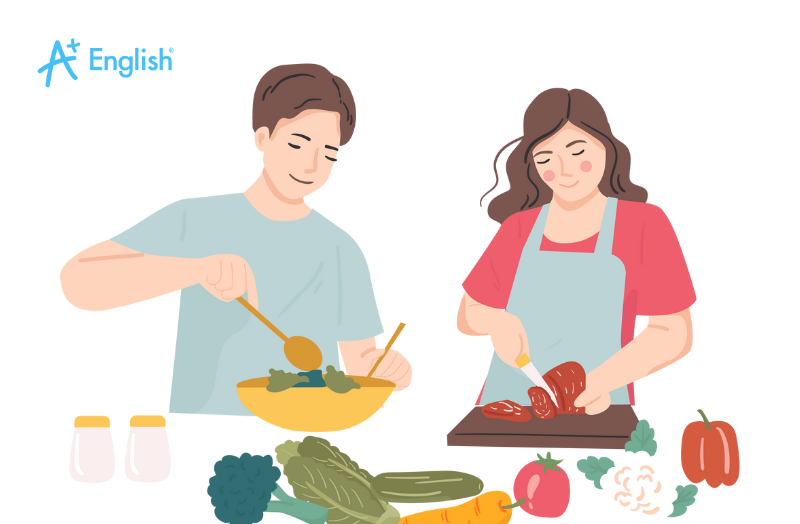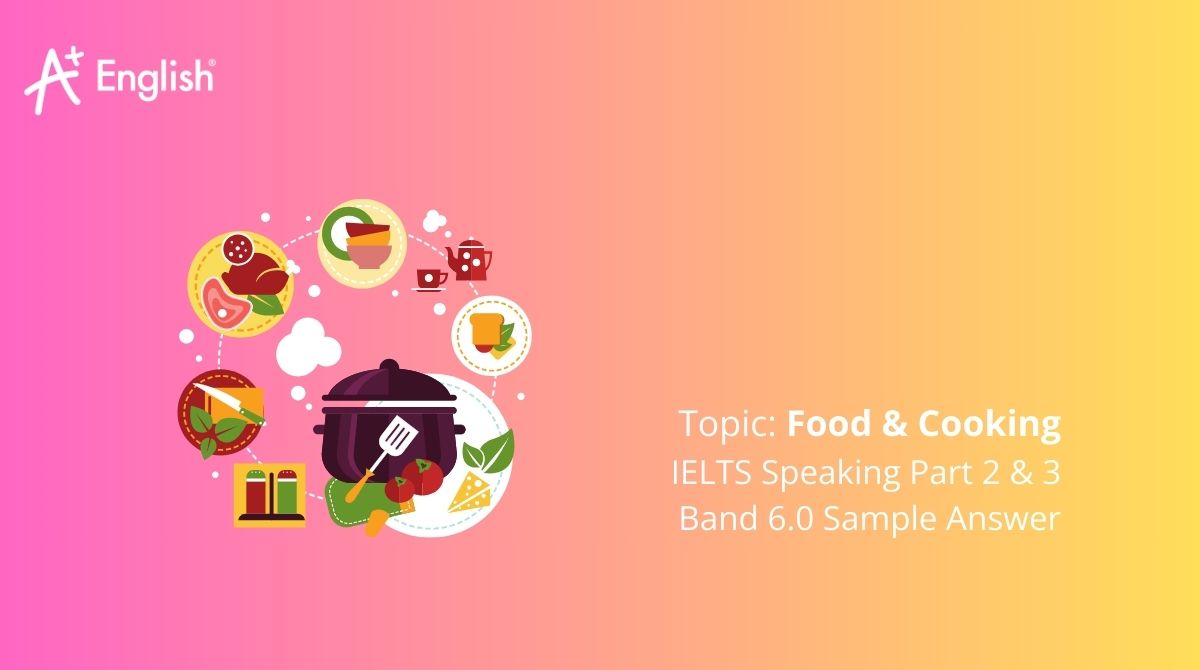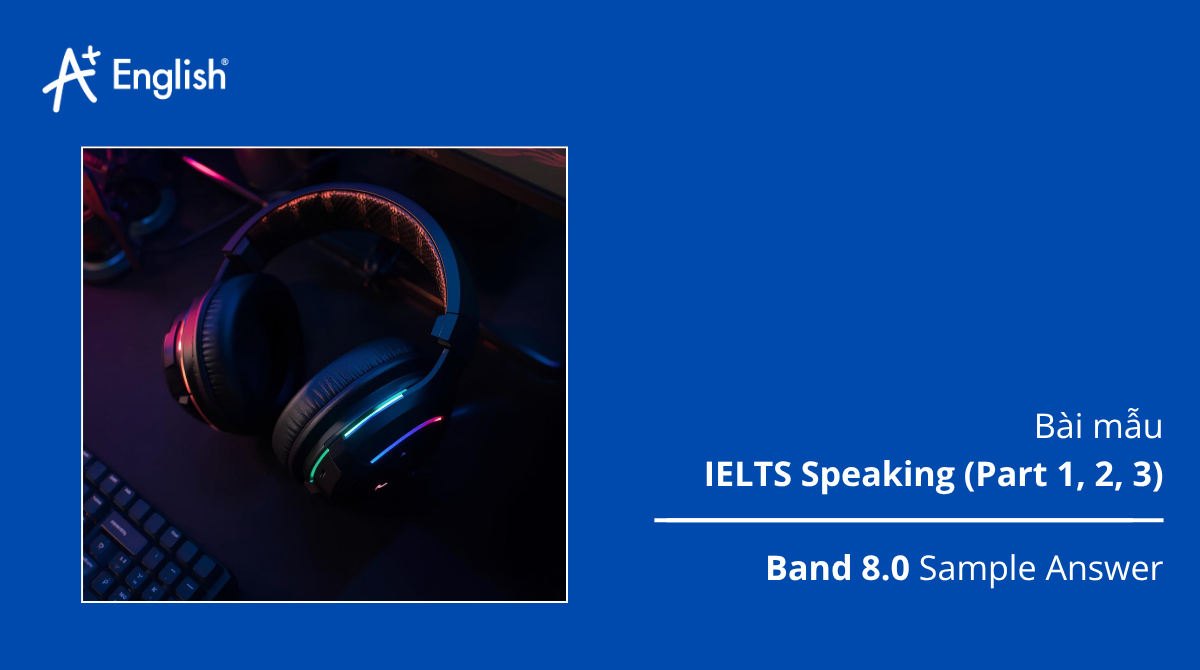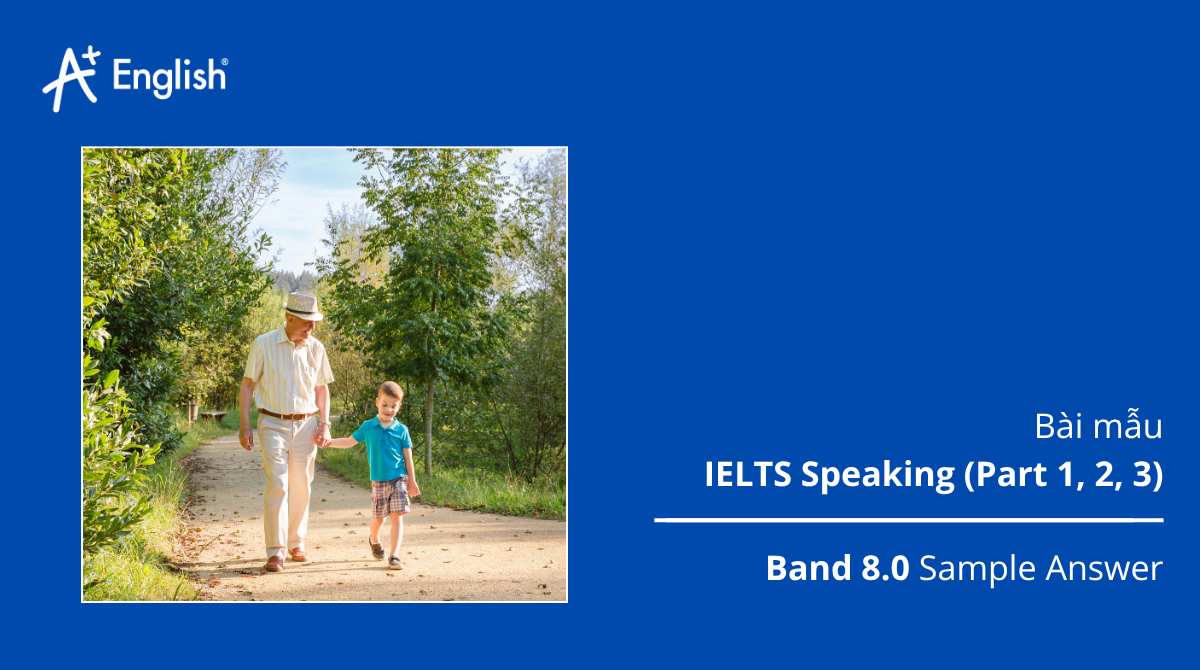Topic Food & Cooking là một trong những chủ đề quen thuộc và thường xuyên xuất hiện trong bài thi IELTS Speaking Part 2 & 3. Đây cũng là chủ đề gắn liền với đời sống hằng ngày, nên thí sinh hoàn toàn có thể khai thác những trải nghiệm cá nhân để trả lời một cách tự tin và tự nhiên hơn.
Trong bài viết hôm nay, A+ English sẽ cùng các bạn khám phá chủ đề IELTS Speaking Part 2 & 3 – Topic: Food & Cooking. Qua đó, bạn sẽ học được cách triển khai ý tưởng, mở rộng vốn từ vựng và luyện tập kỹ năng diễn đạt để có thể làm tốt phần thi nói của mình.
Nội dung chính
Đề mẫu Topic Food & Cooking – IELTS Speaking part 2 & 3
Task 2:
Describe some food or drink that you learned to prepare.
You should say:
- what food or drink you learned to prepare
- when and where you learned to prepare this
- how you learned to prepare this
and explain how you felt about learning to prepare this food or drink
Task 3:
- What kinds of things can children learn to cook?
- Do you think it is important for children to learn to cook?
- Do you think young people should learn to cook at home or at school?
- How enjoyable do you think it would be to work as a professional chef?
- What skills does a person need to be a great chef?
- How much influence do celebrity/TV chefs have on what ordinary people cook?
Source: CAMBRIDGE 18 TEST 1
Ý tưởng triển khai bài nói theo chủ đề Food & Cooking
Task 2:
Describe some food or drink that you learned to prepare:
What food or drink you learned to prepare:
Ví dụ: Món phở hoặc cà phê sữa đá.
When and where you learned to prepare this:
Học từ gia đình hoặc bạn bè, tại nhà hoặc trong lớp học nấu ăn.
How you learned to prepare this:
Theo hướng dẫn, xem video trực tuyến hoặc tham gia lớp học.
How you felt about learning to prepare this food or drink:
Hào hứng, thú vị khi biết thêm kỹ năng mới.
Cảm thấy tự hào khi tự tay hoàn thành món ăn/đồ uống.
Task 3:
What kinds of things can children learn to cook?
Các món đơn giản: trứng chiên, salad, sandwich, nước trái cây.
Do you think it is important for children to learn to cook?
Rất quan trọng: phát triển kỹ năng sống, tự lập và trân trọng thực phẩm.
Do you think young people should learn to cook at home or at school?
Nên học cả ở nhà và trường để cân bằng lý thuyết và thực hành.
How enjoyable do you think it would be to work as a professional chef?
Có thể rất thú vị nếu đam mê, nhưng cũng căng thẳng do áp lực công việc.
What skills does a person need to be a great chef?
Kỹ năng: sáng tạo, kiên nhẫn, tổ chức, kỹ thuật nấu ăn cao cấp.
How much influence do celebrity/TV chefs have on what ordinary people cook?
Ảnh hưởng lớn: mang xu hướng mới, tạo cảm hứng học nấu ăn.
Bài Mẫu (Sample Essay) Band 6.0+

Task 2: Describe some food or drink that you learned to prepare.
One dish I learned to cook is fried rice. I first picked it up last year when my mom was too busy and asked me to make lunch for myself and my younger sister. At first, I wasn’t confident in the kitchen, but I decided to give it a shot because, you know, “practice makes perfect.” I learned step-by-step from a YouTube video, which made it easy to follow.
To prepare the dish, I started by chopping some vegetables like carrots and green beans. I also scrambled eggs and seasoned the rice with soy sauce. Then, I stir-fried everything in a pan. It wasn’t rocket science, but it did require some effort. The first time I made it, the rice was a bit too salty, but my sister loved it anyway. I felt over the moon when she said it was “yummy.”
Learning to cook fried rice was a game-changer for me. Not only did it teach me a useful skill, but it also gave me a sense of responsibility. I realized that even small things, like preparing a meal, can create moments of connection. To be honest, I never thought I’d enjoy cooking, but it turned out to be quite fun. It’s like killing two birds with one stone—I eat good food and learn something useful.
Task 3:
What kinds of things can children learn to cook?
Children can start with simple dishes like scrambled eggs, instant noodles, or sandwiches. These are easy to prepare and help them get their feet wet in the kitchen. Cooking basic meals also teaches them life skills and independence, which are crucial as they grow older.
Do you think it is important for children to learn to cook?
Absolutely! Learning to cook is a life skill that helps children become self-sufficient. It’s also a great way to bond with family members. For instance, cooking together can be a chance to “break the ice” and share stories. Plus, knowing how to cook fosters healthy eating habits.
Do you think young people should learn to cook at home or at school?
Both places have their perks. Cooking at home allows kids to connect with their family and learn traditional dishes. On the flip side, cooking at school introduces them to a variety of techniques and ingredients. It’s like hitting two birds with one stone!
How enjoyable do you think it would be to work as a professional chef?
It depends on the person. For those who love cooking, it’s a dream job. However, it’s not all sunshine and rainbows. The long hours and high-pressure environment can be exhausting. Personally, I think it’s a mixed bag.
What skills does a person need to be a great chef?
A great chef needs creativity to experiment with flavors, patience for perfecting dishes, and strong organizational skills. “Rome wasn’t built in a day,” and neither is culinary expertise!
How much influence do celebrity/TV chefs have on what ordinary people cook?
Celebrity chefs have a massive influence! They inspire people to try new recipes and cooking styles. For example, watching Gordon Ramsay can make anyone feel like whipping up a fancy dish. It’s like they plant the seed, and the rest is up to us.
Từ vựng (Vocabulary) & Cấu trúc ngữ pháp (Grammar)
Từ vựng (Vocabulary)
- Responsibility (n) /rɪˌspɒn.sɪˈbɪl.ə.ti/ – B2
Collocations: Take responsibility (chịu trách nhiệm) & A sense of responsibility (ý thức trách nhiệm) - Influence (n) /ˈɪn.flu.əns/ – B2
Collocations: Exert influence (tác động ảnh hưởng) & A massive influence (sự ảnh hưởng lớn) - Creativity (n) /ˌkriː.eɪˈtɪv.ə.ti/ – B2
Collocations: Foster creativity (nuôi dưỡng sự sáng tạo) & Creativity in cooking (sự sáng tạo trong nấu ăn) - Bond (n) /bɒnd/ – B2
Collocations: Strengthen the bond (củng cố sự gắn kết) & Family bond (sự gắn kết gia đình) - Foster (v) /ˈfɒs.tər/ – B2
Collocations: Foster skills (phát triển kỹ năng) & Foster independence (thúc đẩy tính tự lập) - Introduce (v) /ˌɪn.trəˈdjuːs/ – B2
Collocations: Introduce someone to something (giới thiệu ai đó với điều gì) & Introduce new techniques (giới thiệu các kỹ thuật mới) - Pressure (n) /ˈpreʃ.ər/ – B2
Collocations: Under pressure (dưới áp lực) & High-pressure environment (môi trường áp lực cao) - Connection (n) /kəˈnek.ʃən/ – B2
Collocations: Build a connection (xây dựng mối liên kết) & Connection between (mối liên hệ giữa) - Massive (adj) /ˈmæs.ɪv/ – B2
Collocations: A massive impact (tác động lớn) & Massive influence (sự ảnh hưởng to lớn) - Variety (n) /vəˈraɪ.ə.ti/ – B2
Collocations: A wide variety (sự đa dạng lớn) & Variety of techniques (nhiều kỹ thuật khác nhau)
Thành ngữ (Idioms)
- Practice makes perfect /ˈpræk.tɪs meɪks ˈpɜː.fɪkt/ – Có công mài sắt, có ngày nên kim
- Kill two birds with one stone /kɪl tuː bɜːdz wɪð wʌn stoʊn/ – Một mũi tên trúng hai đích
- Over the moon /ˈoʊ.vər ðə muːn/ – Vô cùng vui sướng
- Break the ice /breɪk ði aɪs/ – Phá vỡ khoảng cách
- Rome wasn’t built in a day /roʊm ˈwɑːznt bɪlt ɪn ə deɪ/ – Thành công không đến trong một sớm một chiều
Cấu trúc ngữ pháp (Grammar)
- Cấu trúc câu điều kiện loại 2 (Second Conditional)
Công thức chung: If + past simple, would + base verb - Mệnh đề quan hệ (Relative Clauses)
Công thức chung: who/that/which + verb - Câu bị động (Passive Voice)
Công thức chung: be + past participle - Câu phức với liên từ phụ thuộc
Công thức chung: Subordinate clause + main clause - Cụm danh từ mở rộng (Noun Phrases)
Công thức chung: Determiner + adjective + noun
Trên đây là bài mẫu của A+ English cho chủ đề IELTS Speaking Part 2 & Part 3 – Food & Cooking, một trong những chủ đề quen thuộc và thường xuyên xuất hiện trong phòng thi. Việc luyện tập trước với những câu hỏi sát với đề thật sẽ giúp bạn làm quen với cách triển khai ý tưởng, trau dồi vốn từ vựng liên quan đến ẩm thực và tự tin hơn khi nói về trải nghiệm cá nhân.
Tại A+ English, bạn sẽ được luyện nói IELTS một cách hệ thống với giáo trình bám sát đề thi thực tế. Đặc biệt, đội ngũ giáo viên tận tâm sẽ hướng dẫn bạn cách xử lý cue card, phát triển ý tưởng logic và mở rộng vốn từ để đạt điểm cao ở cả Part 2 lẫn Part 3.
Nếu bạn đang tìm một khóa học IELTS chất lượng cao, phù hợp với trình độ của mình, hãy liên hệ ngay Tại đây để được tư vấn lộ trình học cá nhân hóa và nhận những tài liệu độc quyền mới nhất!






